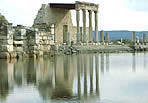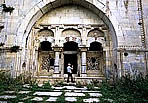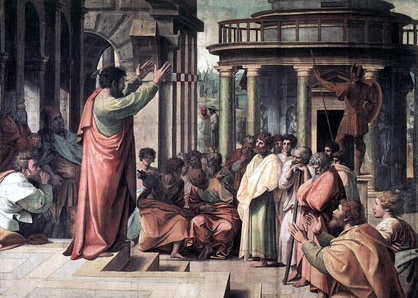Miletos (Milet) Acts 20:15-17, II Tim. 4:20
The southern most Ionian port, Miletos stood at the mouth of the
Meander River. It had a
 long
and glorious history. In the C8-C6 BCE it was strong enough a power
to settle new colonies in areas as far away as the Black Sea, and
maintained an important and profitable trade relationship with
Egypt.
long
and glorious history. In the C8-C6 BCE it was strong enough a power
to settle new colonies in areas as far away as the Black Sea, and
maintained an important and profitable trade relationship with
Egypt.
Famous personalities were associated with the city that was dubbed
the birthplace of Greek philosophy. The great father of philosophy
named Thales lived in the city (640-546 BCE), and was followed by
other important philosophers, such as the so called father of
geography Anaximander (611-547 BCE), Hecataeus the chronicler and
Anaximenes (550-500 BCE).

Pharoah Neco made an offering at the Milesian Temple after his
victory at Megiddo and recapture of Charchemish (608 BCE, cp. 2
Kings 23:29; 2 Chron. 35:20). The offering did not help him from
being overwhelmed a few years later by Nebuccadnezzar II (605 BCE).
The Persians destroyed the the original harbor in 495 BCE, and the
whole area was reconstructed in 479 BCE. This new improved city
suffered a crushing blow at the hands of Alexander the Great (334
BCE) during his campaign through the region. Rebuilt again, the city
boasted four harbors and three agora (market) areas from the
Hellenistic through Roman times (325 BCE to 325 CE).
The city was taken by Rome in 130 BCE, and somewhat redesigned.
During Roman times, the harbor was silting slowly (now creating an
inland lake five miles from the coast). This problem was causing
constant problems and gradually forcing the city into an economic
decline. Another market force also hurt the city.
The major export was likely superior wool called Milesia Vellera
which sold in markets in Rome and Alexandria in the early Roman
period, but also declined when the Romans bred the variety in their
homeland. A city of former glory, it experienced the decline that
eventually befell Ephesus.

St. Paul visited the city some thirty five miles from Ephesus (a two
day journey on foot), allowing some time for the Apostle to
strengthen the Milesian faithful, and to prepare for a moving moment
with his beloved disciples arriving from Ephesus. He loved them, but
he dared not stop in Ephesus if he was going to keep to his vow to
visit Jerusalem by Shavuot. His heart for them as he ended this
third journey is easily spotted in the record of the sermon (Acts
20:22ff).
Among the remains of the city is an impressive theatre that visitors
can enjoy today. The original seated about 15,000 people. Found
among the stones in the excavation between the third and sixth row
of seats, was an inscription that read: Place of the Jews, also
called the God fearing.
Biblical Sites in Turkey List


